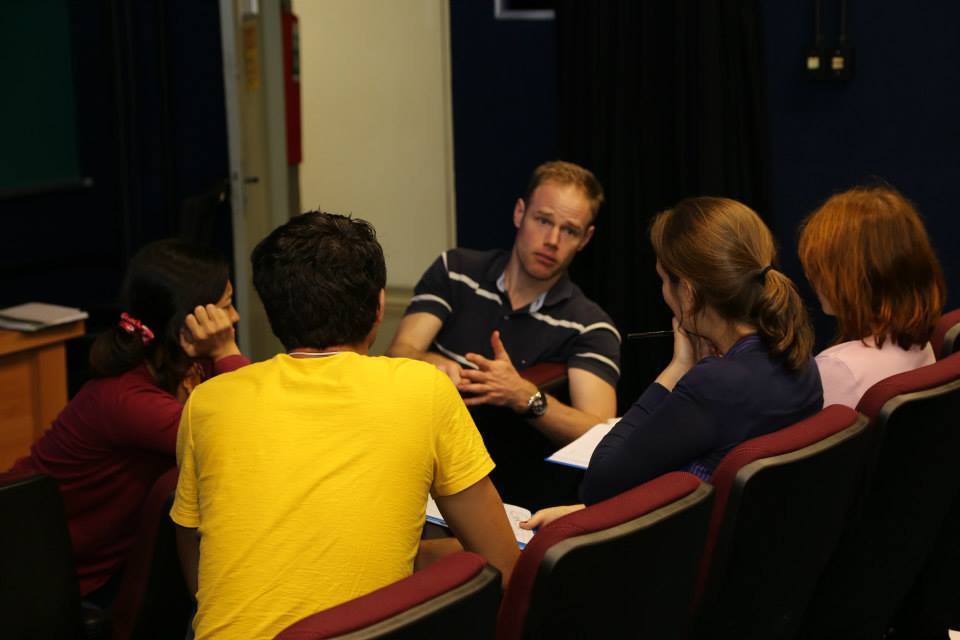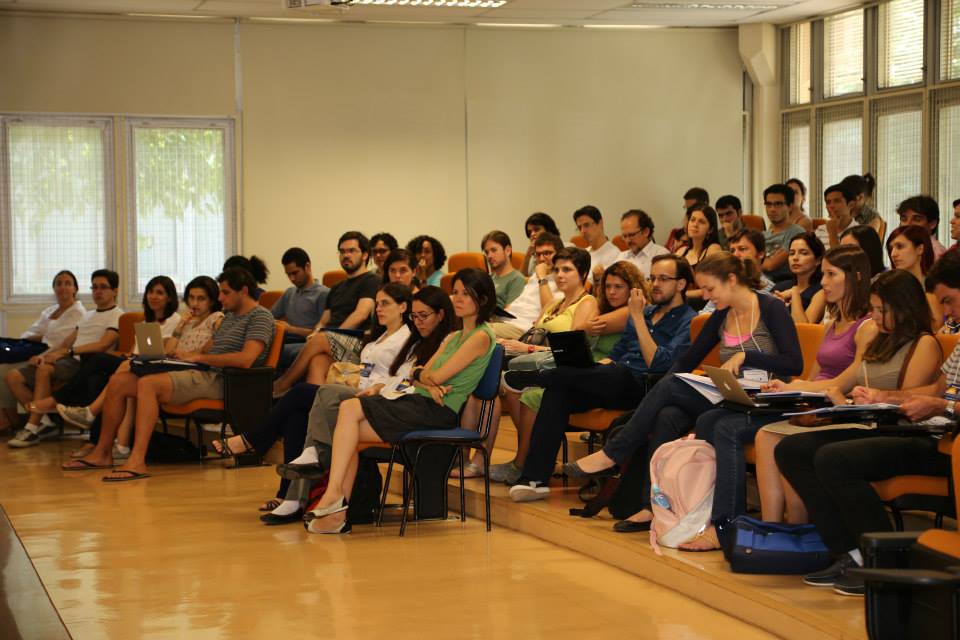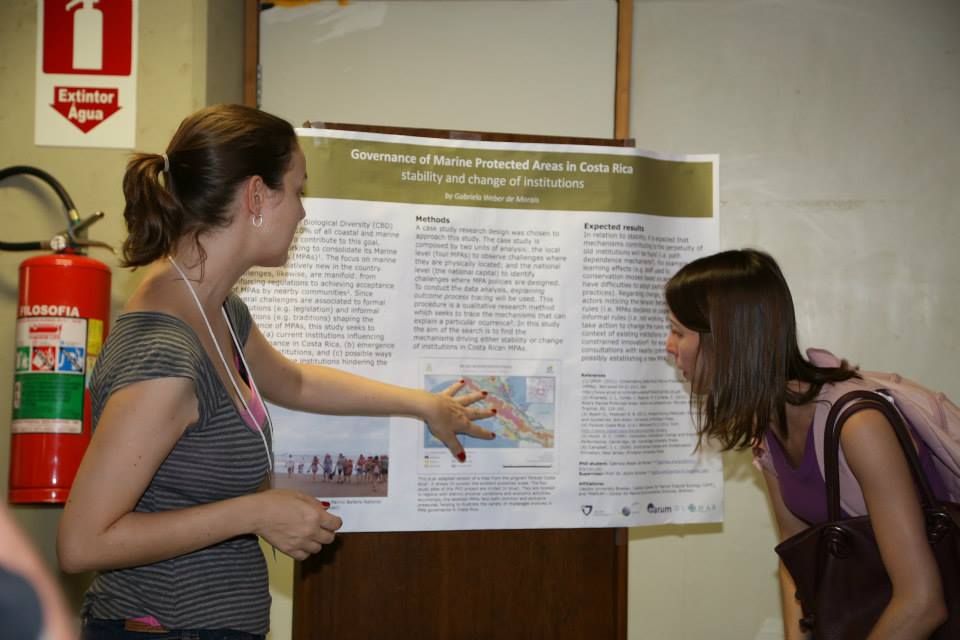Page path:
- Graduate School GLOMAR
- PhD student reports
- Other activities
- Gabriela Weber de Morais
Gabriela Weber de Morais
Report of GLOMAR PhD student Gabriela Weber de Morais about her participation in the IPSA-USP Summer School on Methods and Concepts in Political Science and International Relations, Sao Paulo, Brazil, 3 – 14 February 2014
One of the benefits of having a thesis committee is that you can discuss with its members about intermediary goals of your PhD project and what you need to achieve them. During my project, one of such needs was to further learn about the qualitative data analysis method that I planned to use in my research project. This opportunity came true with the 5th edition of the IPSA-USP Summer School on Methods and Concepts in Political Science and International Relations. Jointly organized by the International Political Science Association (IPSA) and the University of Sao Paulo (USP), the summer school took place between the 3rd and 14th of February, 2014 in Sao Paulo, Brazil. Among the courses offered by it, there was one on “Case Study Methodology” taught by Derek Beach, associate professor at Aarhus University. The course aimed at exploring several topics, including process tracing (method to identify causal mechanisms within a single case study) which I had indeed chosen for my data analysis.
With a group of 27 PhD and master students mainly from Brazil but also from other Latin American countries and Europe, we had the chance to discuss case study methodology within Political Science through a very hands on approach during two weeks. In the first part of the day we had conceptual lectures and presented the research of other classmates followed by a discussion of their projects. Then in the second part of it, we had group exercises to apply the concepts in practice. These exercises were always finished with a final review led by our lecturer. We also had either readings or individual exercises to do every day at home and an opportunity to individually discuss our PhD project methods with Derek during the course.
Some of the students attending the course were using similar theories to the one I am working with, whereas others were also working on topics related to environmental governance. This situation made possible to exchange ideas with many of them. Furthermore, I undertook the course right after finishing the field work and this allowed me to take several doubts to the classes and reflect upon issues I want to investigate more. Another advantage of taking part of this summer school is that it also held interesting information sessions on career paths within Political Science, publishing, differences between European and north American academic systems, and so forth. There was also a poster session in which I presented my research project. My poster was selected among the three best posters, but the most rewarding part, in fact, was to see through the poster presentation how much my project has evolved and how I became more comfortable in answering questions about it in comparison to the earlier stages of my research.
Finally, I think it is worth mentioning that this was the first summer school that I attended. I left with the impression that while the benefits of attending a conference are more related to networking and getting updated about other research projects being developed in similar fields and/or different geographical regions, the benefits of attending a summer school are more related to exploring a topic in depth. Since exploring qualitative data analysis methods was the exact need I had at the current stage of my PhD project, I am very grateful to MARUM and its Graduate School (GLOMAR), which I belong to, for financially supporting me to attend this very rewarding summer school.
With a group of 27 PhD and master students mainly from Brazil but also from other Latin American countries and Europe, we had the chance to discuss case study methodology within Political Science through a very hands on approach during two weeks. In the first part of the day we had conceptual lectures and presented the research of other classmates followed by a discussion of their projects. Then in the second part of it, we had group exercises to apply the concepts in practice. These exercises were always finished with a final review led by our lecturer. We also had either readings or individual exercises to do every day at home and an opportunity to individually discuss our PhD project methods with Derek during the course.
Some of the students attending the course were using similar theories to the one I am working with, whereas others were also working on topics related to environmental governance. This situation made possible to exchange ideas with many of them. Furthermore, I undertook the course right after finishing the field work and this allowed me to take several doubts to the classes and reflect upon issues I want to investigate more. Another advantage of taking part of this summer school is that it also held interesting information sessions on career paths within Political Science, publishing, differences between European and north American academic systems, and so forth. There was also a poster session in which I presented my research project. My poster was selected among the three best posters, but the most rewarding part, in fact, was to see through the poster presentation how much my project has evolved and how I became more comfortable in answering questions about it in comparison to the earlier stages of my research.
Finally, I think it is worth mentioning that this was the first summer school that I attended. I left with the impression that while the benefits of attending a conference are more related to networking and getting updated about other research projects being developed in similar fields and/or different geographical regions, the benefits of attending a summer school are more related to exploring a topic in depth. Since exploring qualitative data analysis methods was the exact need I had at the current stage of my PhD project, I am very grateful to MARUM and its Graduate School (GLOMAR), which I belong to, for financially supporting me to attend this very rewarding summer school.





